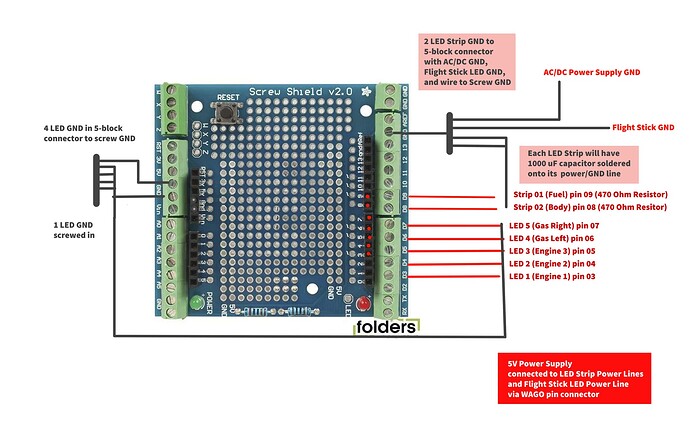I'm re-visiting Arduino after a long time, so I'm sort of new to it. I'm making a game using Unity keypresses to tell Arduino how to control 3 LED lights, and 1 LED strip. I'm using the library here to help with communications between Arduino and Unity.
The 3 LED lights get triggered to flash on/off indefinitely at diff points in the game, until told to turn off, but should still be able to be triggered to flash again later. The LED strip acts like a "health bar" and can either be emptied (turned off), filled to all green, raised or lowered by one light at a time, or filled to all red and then reset back to green again.
Everything, the flashing LEDS and the health bar strip, was working great - until I added in the last functions to turn the strip red and reset back to green. Then, any button that controlled the LAST LED button didn't trigger its flash - it turned off EVERY light on the setup! Then, after taking away the functions for the red - everything worked fine again - tho of course now I can't turn the LED strip red.
Hence, my fear is my code is getting bloated or messy or overloaded somewhere, i.e. my loop is running too fast or has too much stuff in it, but that's where my understanding stops. My output says the sketch uses 22% of program storage space, and global variables use 30% of dynamic memory.
So, my question is, what would I need to better optimize this code? I can send schematics of the circuit if needed too.
Apologies for the giant essay of code ... I'm guessing that's part of the problem!! Thanks in advance for any advice, this feels totally above my head.
#include <FastLED.h>
#include <SerialCommand.h>
#include <SoftwareSerial.h>
// LED strip variable ---------------------------------------------------------------------------
#define NUM_LEDS 11
CRGB leds[NUM_LEDS];
#define LED_PIN 9
static int currentAmt;
// Engine fix variables----------------------------------------------------------------------------
int LED1 = 3;
int LED2 = 4;
int LED3 = 5;
bool led1Trigger;
bool led2Trigger;
bool led3Trigger;
bool led1Flash;
bool led2Flash;
bool led3Flash;
int led1State = LOW;
int led2State = LOW;
int led3State = LOW;
unsigned long prevMillis = 0;
const long interval = 1000;
// communication between unity and arduino--------------------------------------------------
SerialCommand sCmd;
void setup() {
Serial.begin(9600);
// commands for fuel bar -----------------------------------------------------------------------
sCmd.addCommand("FILL", fillHandler);
sCmd.addCommand("RAISE", raiseHandler);
sCmd.addCommand("LOWER", lowerHandler);
sCmd.addCommand("EMPTY", emptyHandler);
sCmd.addCommand("RED", redHandler);
sCmd.addCommand("RESETGREEN", resetGreenHandler);
// commands for engine leds--------------------------------------------------------------
sCmd.addCommand("BLINK1", blink1);
sCmd.addCommand("FIX1", fix1);
sCmd.addCommand("BLINK2", blink2);
sCmd.addCommand("FIX2", fix2);
sCmd.addCommand("BLINK3", blink3);
sCmd.addCommand("FIX3", fix3);
// sets up the LED strip -------------------------------------------------------------------------
FastLED.addLeds<WS2812, LED_PIN, GRB>(leds, NUM_LEDS); // sets up our strip
FastLED.setMaxPowerInVoltsAndMilliamps(5, 500); // limits it to only take 5 volts
FastLED.clear();
FastLED.show();
// sets up the engine LEDS ---------------------------------------------------------------------
pinMode(LED1, OUTPUT);
pinMode(LED2, OUTPUT);
pinMode(LED3, OUTPUT);
}
void loop() {
// for communicating between arduino and unity ----------------------------------------------------
if (Serial.available() > 0) {
sCmd.readSerial();
}
// engine light stuff ---------------------------------------------------------------------------------
unsigned long currentMillis = millis();
// these are all to say if the engine has been triggered, then the matching LED should begin flashing LED 1
if (led1Trigger == true) {
led1Flash = true;
} else {
led1Flash = false;
}
// LED 2
if (led2Trigger == true) {
led2Flash = true;
} else {
led2Flash = false;
}
//LED 3
if (led3Trigger == true) {
led3Flash = true;
} else {
led3Flash = false;
}
// this controls the on/off flashing, and also the ability the turn OFF the flashing
if (currentMillis - prevMillis >= interval) {
prevMillis = currentMillis;
// LED 1
if (led1State == LOW) {
led1State = HIGH;
} else {
led1State = LOW;
}
if (led1Flash == true) {
digitalWrite(LED1, led1State);
} else {
digitalWrite(LED1, LOW);
}
// LED 2
if (led2State == LOW) {
led2State = HIGH;
} else {
led2State = LOW;
}
if (led2Flash == true) {
digitalWrite(LED2, led2State);
} else {
digitalWrite(LED2, LOW);
}
// LED 3
if (led3State == LOW) {
led3State = HIGH;
} else {
led3State = LOW;
}
if (led3Flash == true) {
digitalWrite(LED3, led3State);
} else {
digitalWrite(LED3, LOW);
}
}
}
// engine LED commands -----------------------------------------------------------------------------------------
void blink1(const char *command) { led1Trigger = true; }
void fix1(const char *command) { led1Trigger = false; }
void blink2(const char *command) { led2Trigger = true; }
void fix2(const char *command) { led2Trigger = false; }
void blink3(const char *command) { led3Trigger = true; }
void fix3(const char *command) { led3Trigger = false; }
// fuel bar commands ----------------------------------------------------------------------------------------------
void fillHandler(const char *command) {
for (int i = 0; i < NUM_LEDS; i++) {
leds[i] = CRGB(0, 255, 0);
FastLED.show();
delay(20);
}
currentAmt = NUM_LEDS - 1;
}
void raiseHandler(const char *command) {
if (currentAmt < NUM_LEDS - 1) {
leds[currentAmt] = CRGB(0, 255, 0);
FastLED.show();
currentAmt += 1;
} else if (currentAmt == NUM_LEDS - 1) {
leds[currentAmt] = CRGB(0, 255, 0);
FastLED.show();
}
}
void lowerHandler(const char *command) {
if (currentAmt > 1) {
leds[currentAmt] = CRGB::Black;
FastLED.show();
currentAmt -= 1;
} else if (currentAmt == 1) {
leds[currentAmt] = CRGB::Black;
FastLED.show();
}
}
void emptyHandler(const char *command) {
for (int i = currentAmt; i >= 0; i--) {
leds[i] = CRGB::Black;
FastLED.show();
delay(20);
}
currentAmt = 1;
}
// turns the whole LED strip red ----------------------------------------------------------
void redHandler (const char *command) {
for (int i = 0; i < NUM_LEDS; i++) {
leds[i] = CRGB(255, 0, 0);
FastLED.show();
delay(20);
}
}
//turns the red off, and LED strip back to the amount of green it last had -----------------------------------------
void resetGreenHandler (const char *command) {
for (int i = 0; i < NUM_LEDS; i++){
leds[i] = CRGB::Black;
FastLED.show();
}
for (int i = 0; i < currentAmt; i++) {
leds[i] = CRGB(0, 255, 0);
FastLED.show();
delay(20);
}
}
